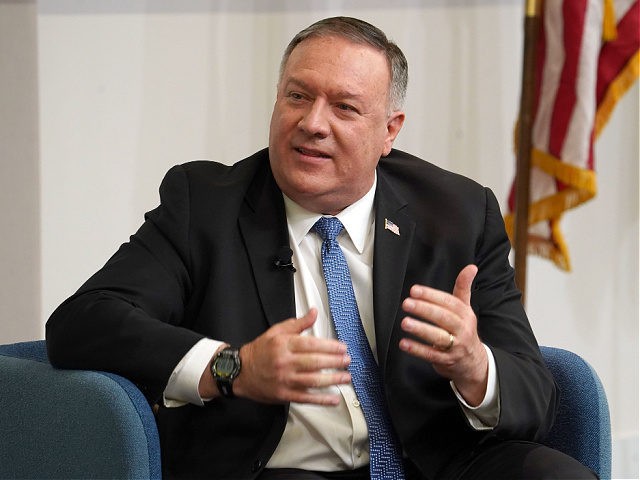Chinese state media insisted Thursday that a blizzard of last-minute sanctions against departing Secretary of State Mike Pompeo and other Trump administration officials was not just an act of petty vengeance, but punishment for having “seriously violated” China’s sovereignty that will bring “real pain” to the targets.
China’s state-run Global Times boiled with rage Thursday, telling members of the incoming Biden administration they should “draw a lesson” from the hideous suffering of their sanctioned predecessors:
Those on the sanctions list have a bad record in trampling on basic norms when dealing with China. In the past four years, they have promoted a series of frenzied acts against China. They have also brazenly interfered in China’s domestic issues, fabricating lies, making accusations and conspiracies about sovereignty-related issues such as Hong Kong, Xinjiang and the island of Taiwan. What they have done undermined China’s interests, offended the Chinese people and seriously disrupted China-US relations.
The sanctions are unprecedented given the number of those sanctioned, their high-ranking positions in the Trump administration and stringent measures against them. The message it has sent is quite clear and strong. “It has conveyed a message that you cannot damage China’s sovereign interests without paying any price. There could be diplomatic frictions and conflicts between countries, but no bottomless acts that cross the line will be allowed,” Song Guoyou, deputy director of the Center for American Studies, Fudan University, told the Global Times.
The Global Times further predicted that “entities having businesses and cooperation with China” will “think twice whether they should develop relations with those former Trump administration officials” when they go hunting for jobs with corporations and think tanks.
“On one hand, politicians that have crossed China’s line should bear the consequences for their anti-China actions. On the other, China needs to use sanctions to deter those who want to make trouble for China. U.S. officials and politicians cannot be allowed to make a profit from China while attacking China,” the editorial fulminated.
Emily Horne, a spokeswoman for the Biden National Security Council, told Reuters on Wednesday that China’s flurry of sanctions was counterproductive and a rude gesture toward the incoming president, as the sanctions were announced on the very day of his inauguration.
“Imposing these sanctions on Inauguration Day is seemingly an attempt to play to partisan divides. Americans of both parties should criticize this unproductive and cynical move. President [Joe] Biden looks forward to working with leaders in both parties to position America to out-compete China,” said Horne.
“China’s decision to impose sanctions on these U.S. individuals is a legitimate and necessary response to their erroneous behaviors that severely violated China’s sovereignty, security and development interests on China-related issues. It fully demonstrates the Chinese government’s determination to safeguard national interests,” Chinese Foreign Ministry spokeswoman Hua Chunying responded Thursday, brushing Horne’s criticism aside.
“I must stress that in the past few years, out of selfish political agenda and bias and hatred against China, some anti-China politicians in the United States planned, worked on and made a lot of crazy moves that severely interfered in China’s internal affairs, undermined China’s interests, hurt the Chinese people’s sentiments, and damaged China-U.S. relations. China has pointed out multiple times that these anti-China politicians will pay for their crazy acts,” Hua said, hitting the same points as the Global Times editorial.
In addition to Pompeo, the sanctioned former Trump administration officials included Health and Human Services Secretary Alex Azar, White House trade adviser Peter Navarro, national security adviser Robert O’Brien, Ambassador to the United Nations Kelly Craft, and even two members of the Trump administration who departed years ago, national security adviser John Bolton and White House chief strategist Stephen K. Bannon. All are prohibited from traveling to China or doing business with any of its commercial entities.

COMMENTS
Please let us know if you're having issues with commenting.